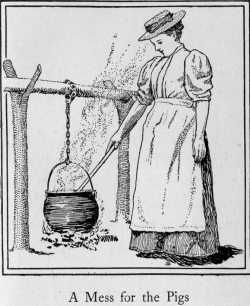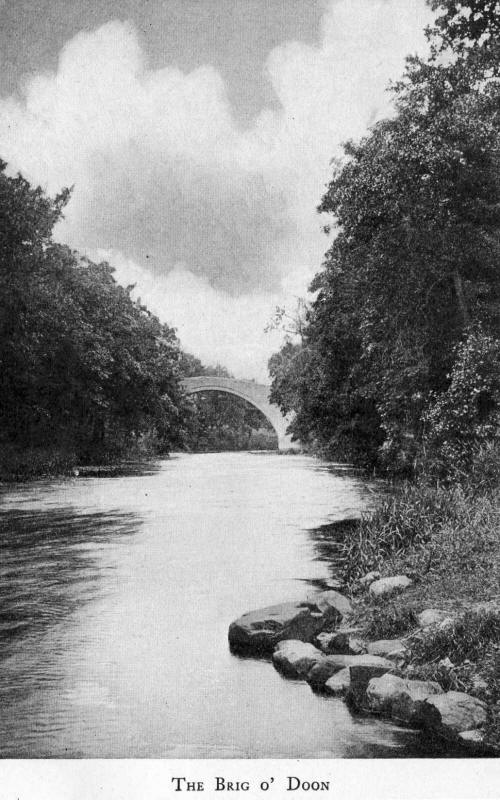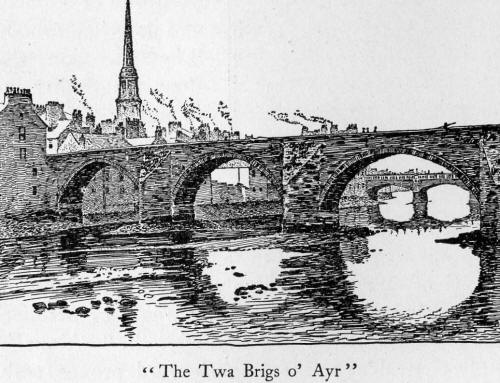|
 ROBERT
BURNS was born January 25, 1759, in a cabin on the outskirts of the city of
Ayr; and for this reason Ayr draws to itself every year hosts of visitors.
These visitors, it is said, number fully twice as many as go to Stratford,
which seems
to argue that Burns has won more hearts than Shakespeare has
won intellects.
You find yourself in a Burns atmosphere the moment you reach the town;
for just outside the station stands an imposing monument to the poet, and
the
shops are full of Burns photographs and mementos,
and nearly all the inns and drinking-places, if not actually named either
after him or after the most famous character he created — Tam o' Shanter,—
are in some other way reminiscent of him. One dingy little inn, that has a
Tam o' Shanter sign hung over its portals, claims to be the veritable place
where Tam, on that fateful winter night
"was glorious,
O'er a' the ills o' life
victorious."
It even preserves the wooden mug out of which Tam drank, and the oak
chair in which he was wont to sit.
Not less interesting are "The Twa Brigs o' Ayr," to which Burns gave such
an entertaining individuality in the poem of that name. When he wrote of
them and immortalized their spirited comments on each other's failings, the
new brig was just nearing completion. Puffed up with pride it scoffingly
asks its rival —
"Will you, poor,
narrow footpath of a street,
Where twa wheelbarrows tremble when they
meet,
Your ruined, formless bulk o' stane an' lime,
Compare wi'
bonnie brigs o' modern time?"
But the auld brig declares —
"I'll be a brig when ye're a shapeless cairn!
As yet
ye little ken about the matter,
But twa-three winters will inform you
better."
Sure enough, the new bridge weakened, and has been replaced, while the
old bridge stands as of yore.
The poet's father, at the time of his famous son's birth, was employed as
a gardener by a gentleman of small estate in the neighborhood, and two miles
out of the town is the low cottage with whitewashed walls and thatched roof,
which was his home. It has a pleasant flavor of unaltered antiquity as seen
from without, though this effect is somewhat counteracted by the many buses,
coaches, and lesser vehicles that stand along the roadside, or that are
constantly coming and going. Until within a few years the house has been an
inn; but now it is public property, kept as a memorial, and the entrance is
guarded by a turnstile, through which you purchase the privilege to pass by
payment of twopence.
The kitchen is the only room of special interest. It was in this room
that Burns first saw the light, and tradition adds that the poet was only a
few days old when a violent storm "tirled" away part of the roof, and mother
and babe were forced to seek shelter in the cottage of a neighbor. The
apartment is still kept in some semblance of its original state, and
contains the old curtained bed in a niche of the wall, a quaint, whitewashed
fireplace, a dresser full of blue crockery, a tall clock, and two ancient
tables notched all over with knife-cut initials. Yet, after all, the
kitchen lacks the touch of life; it is not used, and it has
the stiffness inseparable from a show room.
A short walk beyond the Burns cottage stands the renowned Alloway Kirk,
in which Tam o' Shanter saw the witches. It has long been a ruin, and the
last of the roof fell in three-quarters of a century ago. Even in Burns's
time it had been abandoned, and was going to decay. But the walls continue
intact, and are braced by numerous iron rods that will keep what is left of
the structure erect for many years to come. A little bell still hangs in the
stone arch of the belfry, and a bit of chain attached to it dangles down the
front wall. Wandering among the churchyard graves at the time I visited the
ancient kirk was a gray, bent old man. He was very thin, and his faded coat
hung loosely on his sloping shoulders. Astride his beaked nose he wore a
large pair of antiquated spectacles that gave him a look of owlish wisdom.
He seemed to make it his business to hobble about and act as a guide to all
visitors. Some paid no attention to him, while others found him very
entertaining and instructive. He never varied his tones, and he used the
same showman's words and manner with every party. At frequent intervals, in
the midst of his information, he would break forth into poetry. He pointed
out the stone that marked the graves of Burns's father, and "Agnes Brown,
his spouse," and led his auditors to
the
resting-place of "Souter Johnny." He showed in which direction lay the old
road by which Tam came from Ayr, indicated the window of the church whose
midnight glow arrested Tarn's attention, and through which Tam watched the
scene within; and he told which the other window was where the de'il sat
fiddling for the witches' dancing. At this point the old man would drop his
prose and recite the final verses of the poem with great energy, emphasized
by many gestures of hand and cane. His singsong and his Scotch tang gave the
poem new flavor and attraction, and I loitered until I had heard the recital
several times repeated.
Alloway Kirk is only a short distance from the "banks and braes o' bonnie
Doon." The Doon is an unusually pretty little river that flows swift and
clear between steep, wooded banks. The auld brig across which Tam o' Shanter
made his wild flight is the centre of interest. It has a high, handsome
arch, and over this the road climbs as if it had encountered a little hill.
The highway of the present time preserves a commonplace level across a new
bridge a few rods below, and the auld brig is not much used, save by lovers
of Burns and by an elderly man who stations himself at the top of the arch,
and, like his fellow laborer in the kirkyard, spouts "Tam o' Shanter" to all
comers.
Burns was still a child when his residence in this immediate vicinity
terminated; for he was only seven when his father took a small farm on his
employer's estate. The change proved to be an unfortunate one, his savings
melted away, and presently the family moved ten miles farther into the
country and settled on a second farm at Tarbolton. Here the father died, and
as Burns was the eldest of the seven children, the responsibility of
managing the farm fell on his shoulders. He did not make it pay, and his
troubles multiplied.

Meanwhile he had produced a considerable amount of verse, and at length
he tried the experiment of putting it into book form. The edition was
printed at his own expense, and consisted of only six hundred copies. Yet
these were quickly sold, and left him twenty pounds profit. What was of more
importance, it won him friends in the literary world, who encouraged him to
seek a publisher in Edinburgh. This he did successfully, and the demand for
his poems in the following year made him master of about five hundred
pounds. Now he felt himself to be independent, and he loaned a part of his
wealth to his brother Gilbert, and with the rest took a farm near Dumfries,
resolved to settle himself permanently in the occupation of agriculture. On
this farm, with his wife and children, he spent what were perhaps the
happiest and most tranquil days of his life. Unfortunately
these were not destined to last. In the course of a few years he had
exhausted his resources. The soil yielded poetry, but not, in his case, a
living, and thenceforth he made his home in Dumfries. There he found
employment in the service of the government as an exciseman at a salary of
seventy pounds a year, and this meagre income necessitated the utmost
economy.
As compared with Ayr, which is unusually clean and tidy for a Scotch
town, Dumfries is dirty and crowded. One feels that it is not nearly so much
in harmony with the poet as the quiet pastoral region about his birthplace,
with its fine trees and level fields. The house in which Burns lived when he
moved from the farm is a plain three-story tenement near the river, with
other houses elbowing it on either side. A single upper floor, consisting of
a little kitchen and two other rooms, was all he occupied. At the end of
eighteen months he took another house, and as he had the whole of it, was
perhaps more comfortable than in the tenement by the river. Yet it was very
small, and whoever seeks it now finds it in a shabby neighborhood,
overlooked by big, odorous tanneries. In this house Burns dwelt his last
three years, and it was here he died. His poverty at the time was extreme,
but he was not in debt.
Just around the corner, only a few steps from the little white
cottage among the tanneries, is a great brown church. It is very ancient,
and the churchyard is crowded full of heavy gravestones, monuments, and
tombs — twenty-six thousand of them — and they stand thicker than they would
in a marble yard. There was a grim suggestion, in their close-set rows and
regular placing, of a veritable city of the dead from whose treeless barren
— sunburned, storm-swept, and blasted — all cheer had flown away. At the far
end of this forlorn and stony enclosure the poet lies buried, and over his
remains has been erected an ugly mausoleum that is quite in keeping with the
surroundings, but wholly foreign to the individuality of Burns himself.
The poet's celebrity during his later years made him an object of
interest and curiosity to strangers, and many persons passing through
Dumfries would call on him. He could not conveniently receive them at his
home, and was accustomed instead to go to the town inns, where the
interviews often terminated in convivial excesses. To the taverns he also
was in the habit of going with companions who lived in the town itself; and
wherever he was, the evening was sure to be a merry one, for his good humor
and ready wit were unfailing.
A favorite resort was the Globe Hotel, on a tiny lane just off the
square. Here you can see the dark wainscotted taproom
where Burns used to sing, tell stories, and drink. His table is still there,
and in a corner is the chair to which he was partial, while, if you will
step upstairs, you can see his punch bowl, Jean's workbox, and a verse of "Comin'
through the Rye," just as it was scratched by the poet himself on a
window-pane. It is a privilege to look on these things, for every relic of
Burns and every spot associated with him has something of sacredness; and to
Ayr and Dumfries come pilgrims from the world over to observe for themselves
the scenes familiar to his eyes and celebrated in his verse.

|

